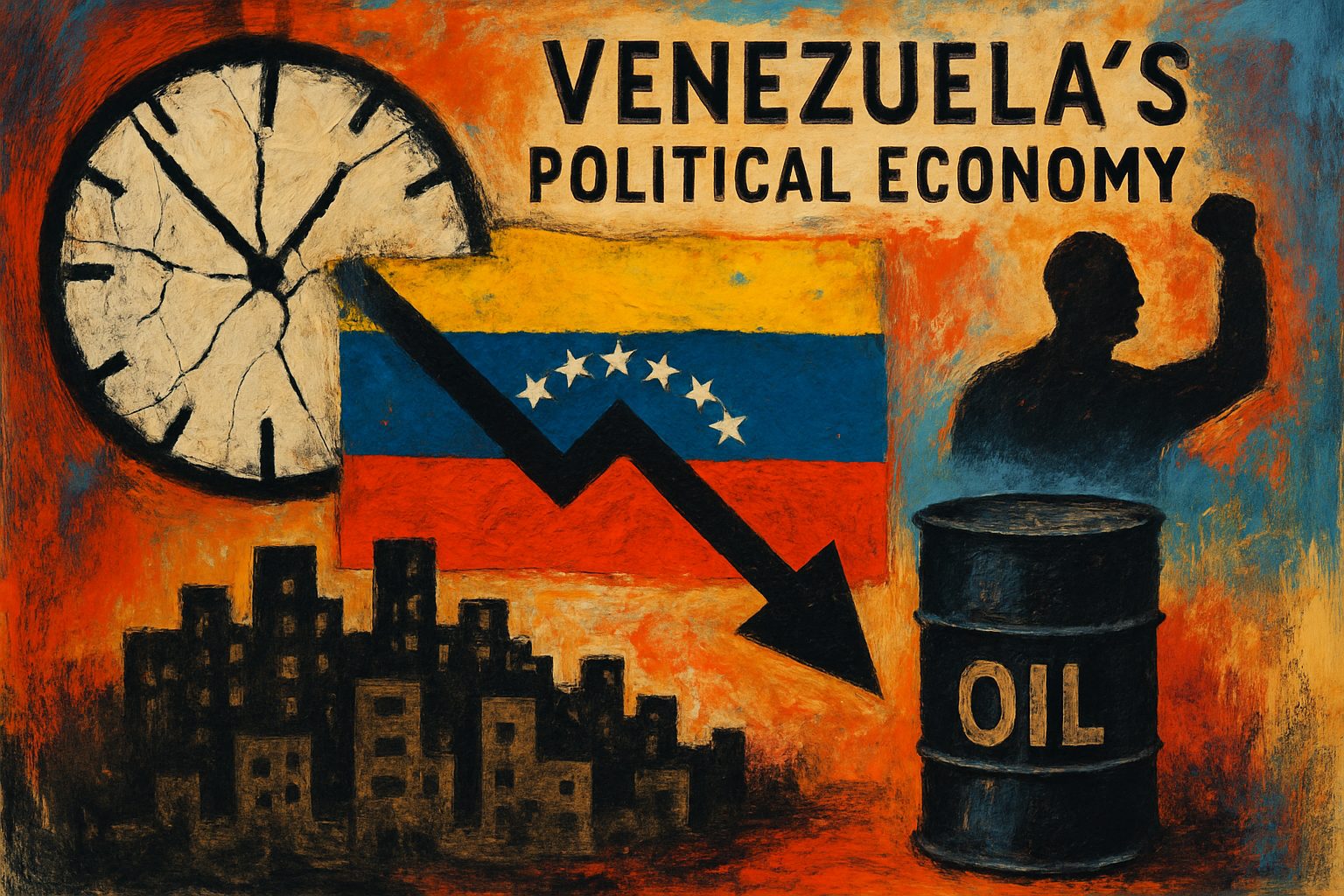
Venezuela’s 50-Year Crisis: How Oil, Politics, and Global Conflict Shaped a Nation’s Collapse
Over the past half-century, Venezuela transformed from Latin America’s wealthiest democracy into its most profound humanitarian crisis. This deep dive explores how oil dependency, revolutionary ideology, and escalating international conflicts created a self-reinforcing cycle of economic collapse and political isolation.

Thesis & Position
Venezuela’s economic trajectory over the past half-century demonstrates how domestic political ideology, resource dependency, and geopolitical alignment have created a self-reinforcing cycle of crisis, international isolation, and authoritarian consolidation. The country’s transformation from Latin America’s wealthiest democracy to its most profound humanitarian crisis stems from the intersection of oil dependency, revolutionary socialism, and escalating conflict with Western powers, particularly the United States.
Historical Context: From Oil Boom to Political Transformation
The Pre-Chávez Era (1970s-1998)
Venezuela experienced an oil-fueled economic boom during the 1970s, becoming one of Latin America’s most prosperous democracies. However, this period also established patterns that would later define the country’s challenges:
- Resource dependency: Oil revenues accounted for approximately 90% of export earnings by the 1980s
- Economic volatility: The 1980s oil price collapse triggered debt crisis and economic instability
- Political disillusionment: Traditional parties faced growing public discontent over corruption and inequality
The Punto Fijo pact power-sharing arrangement between dominant parties eventually collapsed amid economic crisis and social unrest, creating the conditions for Hugo Chávez’s rise.
The Bolivarian Revolution: Economic Transformation and Political Polarization
Chávez Era (1999-2013)
Hugo Chávez’s election in 1998 marked a fundamental shift in Venezuela’s political and economic model. His Bolivarian Revolution implemented sweeping changes:
| Policy Area | Objectives | Outcomes |
|---|---|---|
| Economic Nationalization | State control of strategic sectors | Increased government revenue but declining private investment |
| Social Programs | Poverty reduction through oil wealth redistribution | Initial poverty reduction but unsustainable long-term |
| Political Reform | Participatory democracy and constitutional change | Concentration of power in executive branch |
The Chávez administration benefited from historically high oil prices (2004-2014), which funded expansive social programs while enabling the nationalization of key industries including oil, electricity, and telecommunications.
“The practices that began under the Chávez administration’s Bolivarian Revolution and continued under Maduro created fundamental economic distortions” – Congressional Research Service
Economic Policies and Their Consequences
The revolutionary government implemented several distinctive economic approaches:
- Currency and exchange controls (2003): Established fixed exchange rates with multiple tiers
- Price controls: Extensive controls on basic goods and services
- Expropriations: Large-scale nationalizations across multiple sectors
- Import substitution: Heavy reliance on imports despite rhetoric of self-sufficiency
These policies produced mixed results initially but created systemic vulnerabilities:
- Advantage: Short-term poverty reduction and increased access to services
- Limitation: Created black markets, shortages, and production collapse
- Critical flaw: Made economy entirely dependent on oil revenue sustainability
The Crisis Acceleration (2013-Present)
Maduro’s Inheritance and Escalation
Nicolás Maduro inherited an economy already showing signs of strain when he took office in 2013. The situation deteriorated dramatically due to converging factors:
- Collapsing oil prices (2014-2016)
- Production declines in nationalized industries
- Hyperinflation triggered by monetary expansion
- Capital flight and investment collapse
By 2017, the humanitarian impact had become severe: “Almost 75% of the population had lost weight due to hunger, with the average Venezuelan losing about 8.7 kg (19 lbs) due to lack of proper nutrition.”
Economic Indicators Comparison (2012 vs. 2019)
| Indicator | 2012 | 2019 | Change |
|---|---|---|---|
| GDP (USD) | $382B | $70B | -82% |
| Oil Production | 2.9M bpd | 0.8M bpd | -72% |
| Inflation | 21% | 19,900% | 94,666% |
| Poverty Rate | 32% | 96% | +200% |
<script
Thesis & Position
Venezuela’s economic trajectory over the past half-century demonstrates how resource nationalism, ideological polarization, and geopolitical alignment have created a self-reinforcing cycle of economic decline, authoritarian consolidation, and international isolation. The country’s transformation from Latin America’s wealthiest democracy to its most profound humanitarian crisis stems from the intersection of failed economic policies, democratic erosion, and confrontational foreign relations that have intensified under both the Chávez and Maduro administrations.
Evidence & Facts: The Economic-Political Nexus
The Oil Dependency Foundation
Venezuela’s modern political economy has been fundamentally shaped by its petroleum resources, creating what economists term the resource curse – where natural resource wealth leads to economic distortion and institutional weakness. The nationalization of oil in 1976 established a pattern of state-centric economic management that would intensify under later governments.
Key economic indicators show a dramatic reversal:
– From having Latin America’s highest GDP per capita in the 1970s to experiencing a 75% economic contraction between 2013-2021
– Hyperinflation reaching 1.7 million percent in 2018, effectively destroying savings and purchasing power
– By 2017, almost 75% of the population had lost weight due to food shortages and poverty
The Crisis in Venezuela intensified under the Maduro government, growing more severe as a result of low oil prices in 2015, and a drop in oil production from lack of maintenance and investment.
Political Transformation and Economic Management
The 1999 election of Hugo Chávez marked a decisive turning point. His Bolivarian Revolution implemented:
- Constitutional reforms concentrating power in the executive
- Expropriation of private assets across multiple sectors
- Price controls and currency exchange mechanisms that created massive distortions
- Social programs funded directly by oil revenues rather than sustainable taxation
These policies began under Chávez and continued under Maduro, creating what experts describe as a rentier state where political loyalty is exchanged for resource distribution rather than earned through effective governance.
Critical Analysis: Weighing Competing Explanations
Internal vs. External Causes
The debate around Venezuela’s collapse typically divides between those emphasizing domestic policy failures and those highlighting external factors including sanctions and market pressures:
| Factor | Domestic Policy Explanation | External Pressure Explanation |
|---|---|---|
| Economic Collapse | Price controls, expropriation, corruption, mismanagement | Oil price collapse, international sanctions, capital flight |
| Political Crisis | Democratic erosion, authoritarian practices, institutional breakdown | Foreign intervention, regime change efforts, media campaigns |
| Humanitarian Crisis | Failed economic model, corruption, incompetence | Sanctions blocking medical imports, financial isolation |
The Congressional Research Service report Venezuela: Background and U.S. Relations notes that while U.S. sanctions have exacerbated the crisis, “the deterioration of Venezuela’s economy began before the imposition of the most severe U.S. sanctions.”
The Oil Production Collapse: A Case Study in Mismanagement
The decline in Venezuela’s oil production illustrates the intersection of technical incompetence and ideological commitment:
nationalization → underinvestment → production decline → revenue shortfall → crisis
This feedback loop demonstrates how ideologically-driven policy without technical expertise leads to systemic failure. The state oil company PDVSA became increasingly politicized, with technical positions filled based on political loyalty rather than merit.
Foreign Policy and International Conflicts
The Anti-Imperialist Posture
Venezuela’s foreign policy under Chávez and Maduro has been characterized by confrontation with the United States and alignment with rival powers including Russia, China, Iran, and Cuba. This orientation served both ideological and practical purposes:
- Geopolitical diversification reducing dependence on U.S. markets
- Ideological solidarity with other anti-Western states
- Strategic partnerships providing economic and political support
The United States–Venezuela relations have deteriorated significantly, with mutual accusations of interference and aggression.
Regional Diplomacy and Isolation
Venezuela’s regional influence has followed a pendulum swing:
- 2000-2013: Leadership of regional blocs (ALBA, UNASUR), energy diplomacy (Petrocaribe)
Thesis & Position
Venezuela’s economic trajectory from 1974 to 1999 demonstrates how oil dependency fundamentally shaped political and economic decisions, creating a cyclical pattern of boom-driven expansion followed by bust-induced austerity. The period reveals how successive governments—regardless of political orientation—became trapped in a rentier state model where oil revenues dictated policy choices rather than sustainable development strategies. This analysis examines how political shifts between traditional parties, external pressures, and internal contradictions created Venezuela’s economic foundation prior to the Chávez era.
Historical Context: The Punto Fijo System and Oil Dependency
Venezuela’s modern political economy emerged from the Punto Fijo Pact, a power-sharing agreement between dominant political parties that established stability but also entrenched oil dependency. As noted by analysts, “Perhaps the most important thing to know about Venezuela is that it is an oil exporting country… This fact is of immense importance to understanding Venezuela because it has shaped practically every aspect of the country” (Venezuela Analysis).
The 1970s oil boom created unprecedented wealth but also established problematic patterns:
- Revenue volatility: Economic planning became tied to unpredictable oil price fluctuations
- Dutch Disease: Oil exports crowded out other sectors, preventing economic diversification
- Political patronage: Oil revenues funded extensive social programs that created dependency without sustainable development
The Oil Boom Era (1974-1983): Nationalization and Expansion
Key Policies and Political Drivers
President Carlos Andrés Pérez (1974-1979) capitalized on soaring oil prices following the 1973 OPEC embargo. His administration pursued an ambitious agenda:
- Oil Nationalization (1976): The government took control of foreign oil assets, creating PDVSA (Petróleos de Venezuela, S.A.)
- Massive public spending: Oil revenues funded infrastructure, education, and health programs
- Import-substitution industrialization: Efforts to diversify beyond oil through protected domestic industries
The nationalization reflected resource nationalism and confidence in state-led development. As one analysis notes, “the strong PDVSA eventually became a state within the state” (UKDiss), indicating how the oil company gained extraordinary autonomy and influence.
Economic Outcomes and Structural Problems
| Policy Area | Short-Term Success | Long-Term Problems |
|---|---|---|
| Nationalization | Increased state revenues | Lack of technical expertise, inefficiency |
| Social Programs | Reduced poverty, improved access | Unsustainable without continuous oil revenue |
| Industrial Policy | Some manufacturing growth | Failed to create competitive export sectors |
The boom period created what economists call rentier state mentality—the expectation that oil would perpetually fund government programs without requiring economic diversification or fiscal discipline.
The Crisis Years (1983-1989): External Shocks and Initial Reforms
The 1983 Devaluation and Economic Turning Point
The 1980s brought severe challenges: falling oil prices, rising debt, and economic stagnation. President Luis Herrera Campíns (1979-1984) faced:
- External debt crisis: Venezuela’s borrowing during boom years became unsustainable
- Falling oil revenues: From $19.3 billion (1981) to $13.5 billion (1983)
- Currency pressure: The bolívar became overvalued, requiring adjustment
The landmark 1983 devaluation (Black Friday) ended Venezuela’s fixed exchange rate and revealed the fragility of the oil-dependent model. The government implemented austerity measures but resisted comprehensive structural reform due to political constraints.
Neoliberal Turn: The Pérez Shock (1989-1993)
The IMF Package and Economic Liberalization
Re-elected in 1988, Carlos Andrés Pérez dramatically reversed his previous statist policies, implementing what became known as “El Gran Viraje” (The Great Turnaround). Facing severe economic constraints, his government embraced neoliberal reforms:
policy_package = {
"fiscal_austerity": budget_cuts,
"trade_liberalization": tariff_reduction,
"privatization": state_asset_sales,
"deregulation": market_opening,
"currency_flotation": exchange_rate_flexibility
}
As research indicates, *”Pérez was not the one to blame on such a decision, considering the fact that the report included a conclusion
Vyftec – Expert Research & Analysis Solutions
At Vyftec, we specialize in delivering robust, data-driven research and analysis platforms tailored to complex domains. Our expertise includes building automated data aggregation systems, dynamic dashboards for visualizing economic and geopolitical trends, and secure backend infrastructures for handling sensitive information. For instance, we developed advanced trading and analytics bots (e.g., DMX-Bot) featuring real-time API integrations, statistical modeling, and interactive data visualization—tools that align perfectly with your need for in-depth analysis of Venezuela’s economy and its geopolitical interactions. Using Laravel, Python, and AI-augmented workflows, we ensure accuracy, scalability, and actionable insights.
Leveraging Swiss precision and a agile, security-focused approach, we transform raw data into compelling, user-friendly reports and analytical tools. Let’s discuss how we can support your project with efficiency and expertise.
📧 damian@vyftec.com | 💬 WhatsApp


